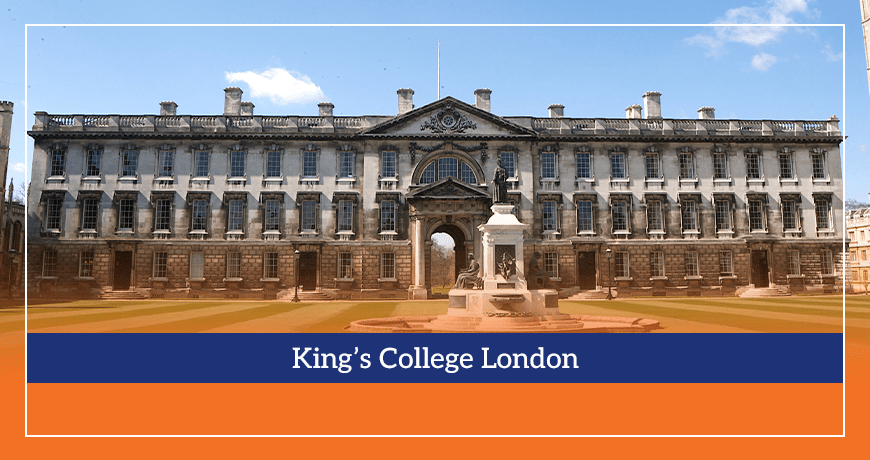Did you know the UK is home to some of the oldest and most prestigious public universities in the world, each with its own legacy of excellence? For centuries, students from all over the globe have flocked to the UK in search of high-quality education, drawn by the unique blend of rich history and cutting-edge innovation found at its top public universities. From renowned research facilities to world-class faculty, these institutions offer unparalleled academic and personal growth opportunities.
In this article, we’ll explore some of the top public universities in UK and what sets them apart, covering their strengths, special programs, and diverse student experiences. Whether you’re considering studying abroad or simply curious about the world’s most respected institutions, you'll gain valuable insights into what makes these universities exceptional choices for higher education.
Overview of Public Universities in the UK
The UK has a long history of public universities that dates back centuries. Some institutions, like the University of Oxford and the University of Cambridge, were established as early as the 12th and 13th centuries. Over the years, the number of public universities offering higher education in the UK has increased significantly.
Policies like establishing the Research Excellence Framework (REF) impact the structure of UK public universities. The UK government uses its direct funding for teaching and research. It also provides loans and grants to students to cover tuition fees and help with living costs.
Besides quality education, UK university research impacts are key to many innovations. Many of the world’s leading scientific discoveries and technological advancements originated from public university research in the UK. Overall, having a chance to learn there can be a wise choice.
Criteria for Ranking Public Universities
Below are the top 10 public universities in the UK. We have followed these criteria to rank them.
Academic Excellence
It is one of the primary criteria for ranking universities. This includes the qualifications and expertise of faculty members. It also includes the student-to-teacher ratio. It plays a significant role, as a lower ratio typically indicates better student learning experiences.
Infrastructure
Academic demands include libraries, labs, and science or modern technology facilities. That’s why Universities that offer supportive campus environments are prioritised in the ranking. The quality of student accommodations is also important for a balanced lifestyle.
Student Support Services UK
When rating public colleges, the quality of student support is also taken into account. These supports include UK university scholarships and financial aid programs, which help to make higher education more accessible to students from various backgrounds. Mental health services, academic advising, and career counselling are also part of this.
Reputation and Accreditation
The reputation of a public university, both nationally and internationally, is often measured through various ranking systems that assess universities on a global scale, such as the QS World University Rankings, British Public Universities Ranking and the Times Higher Education World University Rankings. Also, UK university accreditation and recognition from prestigious institutions enhance a university's reputation.

Top 10 Public Universities in the UK
We know the UK is the home of many reputed universities. Following the above criteria, we have listed 10 best public universities in the UK with details.
1. University of Cambridge
The University of Cambridge is among the world’s oldest and most respected universities. It operates as a collegiate-based research university with 31 semi-autonomous colleges. The university focuses on research in STEM, social sciences, and humanities.
In 2025, Cambridge ranked fifth in the QS World University Rankings. Almost 40% of students come from over 140 countries. Cambridge is known for its quality teaching and research, which makes employers seek its graduates. The flexibility of the curriculum, aligning with one's passion, also attracts students. Therefore, it has become popular among international students.
Key Departments
- Engineering
- Medicine
- Economics
- Law
- Computer Science
Tuition Fee: Approximately £22,000-£58,000 annually.
Undergraduate Duration: Typically 3-4 years
Postgraduate Duration: 1-2 years for master’s programs
Established: 1209
Total Programs: Over 300 undergraduate and postgraduate programs
Total Students: Approximately 24,500
Total Faculty: 5,502
Scholarships: Various scholarships, including the Gates Cambridge Scholarship for international students.
Location: Cambridge, England
2. University of Oxford
The University of Oxford, founded in 1096, is the oldest English university in the world. It operates on a collegiate system with 39 colleges and 70 research departments in various disciplines, including Neuroscience, Cell Physiology, and Cardiac Sciences.
The university ranked third globally by the QS World University Rankings 2025. It is the home of more than 70 Nobel Laureates, like Erwin Shrödinger, Roger Penrose, T.S. Eliot, and many others.
Around 45% of the university’s students have come from 160 countries. Out of every 100 applicants, almost 18 students get accepted to Oxford. Alongside stunning architecture, history, and culture, It is also recognized as one of the top 10 safest student cities in the UK, making it an appealing location.
Key Departments
- Medicine
- Law
- Physics
- Philosophy
- Computer Science
Tuition Fee: Approximately £26,000-£37,000 annually.
Undergraduate Duration: Typically 3-4 years
Postgraduate Duration: 1-2 years for master’s programs
Established: 1096
Total Programs: Over 250 undergraduate and postgraduate programs
Total Students: Approximately 27,000
Total Faculty: Approximately 2,000
Scholarships: Rhodes Scholarship, Clarendon Fund, and other international scholarships
Location: Wellington Square, Oxford OX1 2JD, United Kingdom
3. Imperial College London
Imperial College London is known for its strong focus on science, engineering, medicine, and business. It is a top-ranked university that consistently appears in the top 10 global rankings, including the QS World University Rankings, where it placed second in 2025.
The college attracts students from more than 140 countries, and more than half of its students are international. Their campus life attracts the students the most. Two Royal Parks (Hyde Park and Kensington Gardens) are within a 10-minute walk of campus.
Imperial College is exclusively dedicated to STEM education. Many of its programs are ranked within the top 10 globally.
Key Departments
- Engineering
- Medicine
- Business
- Computer Science
- Mathematics
Tuition Fee: Approximately £35,000-£45,000 annually.
Undergraduate Duration: Typically 3-4 years
Postgraduate Duration: 1-2 years for master’s programs
Established: 1907
Total Programs: Over 200 undergraduate and postgraduate programs
Total Students: 22,255 (2022/23)
Total Faculty: 3,700
Scholarships: President's Scholarship, Dean's Master's Scholarship, and others for international students
Location: South Kensington, London SW7 2AZ, United Kingdom

4. University College London (UCL)
UCL is known for its research-intensive approach and commitment to innovation in education. According to the Research Excellence Framework 2021, it was ranked second for research power. UCL is also part of the golden triangle of research-intensive universities.
UCL is a popular choice for international students due to its diverse and inclusive academic environment. Nearly 48% of its student body comes from outside the UK.
This institute is ranked in the top 10 globally in the QS World University Rankings 2025. It offers more than 300 programs, the most compatible of which are BSc in philosophy, politics, and economics.
Key Departments
- Medicine
- Architecture
- Law
- Engineering
- Social Sciences
Tuition Fee: Approximately £20,000-£38,000 per annum.
Undergraduate Duration: Typically 3-4 years
Postgraduate Duration: 1-2 years for master’s programs
Established: 1826
Total Programs: Over 300 undergraduate and postgraduate programs
Total Students: 51,810 (2022/23)
Total Faculty: Around 7,000 faculty members
Scholarships: UCL Global Undergraduate Scholarship, UCL Graduate Scholarship
Location: London, England
5. University of Edinburgh
Scotland hosts four historic universities, including the University of Edinburgh. During the late eighteenth and early nineteenth centuries, this university was one of the cultural and philosophical centres. Today, the university is a League of European Research Universities member.
This university's research background is very famous. It ranked 4th in the UK’s Research Excellence Framework 2021. They performed groundbreaking research, including discovering chloroform anaesthesia, the Higgs boson particle, and in-vitro fertilization.
Its strong priority is research, which attracts the most international students. The university has more than 50,000 students from more than 140 countries.
Key Departments
- Medicine
- Informatics
- Engineering
- Business
- Law
Tuition Fee: Approximately £20,000-£32,000 for international students annually.
Undergraduate Duration: Typically four years
Postgraduate Duration: 1-2 years for master’s programs
Established: 1583
Total Programs: Over 300 undergraduate and postgraduate programs
Total Students: Approximately 40,000
Total Faculty: Around 3,000 faculty members
Scholarships: Edinburgh Global Undergraduate Scholarship, Chevening Scholarship
Location: Edinburgh, Scotland, UK
6. University of Manchester
The University of Manchester was officially established in 2004, but its history dates back to the civic university movement in the nineteenth century. This institution was created by merging the Victoria Institution of Manchester and the University of Manchester's Institute of Science and Technology (UMIST).
Manchester University is the third largest university in the UK according to the student enrollment number. The university is recognized as one of Britain’s most famous forward-thinking universities that combines a rich heritage with a forward-looking approach.
The university’s campus features a museum, art gallery, concert venues, and over 400 clubs and societies. With more than 45,000 students, the campus has a diverse culture.
Key Departments
- Engineering
- Medicine
- Business
- Social Sciences
- Life Sciences
Tuition Fee: £20,000-£45,000 annually for international students.
Undergraduate Duration: Typically 3-4 years
Postgraduate Duration: 1-2 years for master’s programs
Established: 1824
Total Programs: Over 400 undergraduate and postgraduate programs
Total Students: Approximately 40,000
Total Faculty: Around 7,000 faculty members.
Scholarships: Manchester Global Scholarship, Equity and Merit Scholarships for international students
Location: Manchester, England, United Kingdom.

7. King’s College London
King’s College London was founded under the patronage of King George IV. The university has five campuses in the city and is highly regarded in humanities, law, healthcare, and international affairs.
This public university has six medical research council centres, making it the largest European biomedical research centre. It has 15,000 international students from 185 countries, offering a global community to learn about diverse cultures.
Key Departments
- Medicine
- Law
- Humanities
- Engineering
- Social Science & Public Policy
Tuition Fee: Approximately £20,000-£37,000 per annum.
Undergraduate Duration: Typically 3-4 years
Postgraduate Duration: 1-2 years for master’s programs
Established: 1829
Total Programs: Over 300 undergraduate and postgraduate programs
Total Students: Approximately 33,000
Total Faculty: Around 4,000 faculty members
Scholarships: King’s International Scholarship, Chevening Scholarship
Location: Strand, London WC2R 2LS, United Kingdom
8. London School of Economics and Political Science (LSE)
LSE is one of the UK’s well-reputed public research universities. They are dedicated to the study and research of the social sciences. The university also offers bachelor’s, master’s, and doctoral degree programs for students worldwide. About 70% of their students are from outside of the UK.
This research-based university ranked 3rd in Social Sciences and Management and 6th in Economics and Econometrics. The 2025 QS Rankings also listed this institute among the top 50 universities worldwide. Overall, a prominent university for international students.
Key Departments
- Economics
- Law
- Sociology
- Political Science
- International Relations
Tuition Fee: Approximately £21,000-£34,000 yearly for international students.
Undergraduate Duration: Typically three years
Postgraduate Duration: 1 year for most master’s programs
Established: 1895
Total Programs: Over 180 undergraduate and postgraduate programs
Total Students: Approximately 11,000
Total Faculty: Around 1,700 faculty members
Scholarships: LSE Undergraduate Support Scheme, LSE Graduate Support Scheme
Location: London, England
9. University of Bristol
The University of Bristol is a member of the Russell Group universities of research-intensive institutions. In THE analysis of REF 2021, Bristol University was ranked as one of the top five UK institutions for research. 94% of their research is ‘world-leading’ or ‘internationally excellent.’ This institute is the first UK university to declare a climate emergency.
Bristol offers more than 500 degrees. The campus is the heart of this university, situated in a friendly and beautiful city in the south-west of England. Around 25% of its students are from outside the UK.
Key Departments
- Engineering
- Medicine
- Law
- Business
- Environmental Sciences
Tuition Fee: £20,000-£35,000 annually for international students.
Undergraduate Duration: Typically 3-4 years
Postgraduate Duration: 1-2 years for master’s programs
Established: 1876
Total Programs: Over 200 undergraduate and postgraduate programs
Total Students: Approximately 28,000
Total Faculty: Around 2,000 faculty members
Scholarships: Think Big Undergraduate Scholarships, Chevening Scholarships
Location: Tyndall Ave, Bristol BS8 1TH, United Kingdom
10. University of Warwick
Warwick University was founded as a UK government initiative to expand higher education in London. It is a world-class university with the highest academic and research standards. In the 2021 Research Excellence Framework, 92% of its research was considered 'world-leading' or 'internationally excellent.'
Warwick is divided into three schools. Under which there are 32 departments. Here, you will learn your academics with new thinking. The university invests in student services and campus facilities. They will support you with accommodation help, career advice, counselling, and health services.
Key Departments
- Business
- Engineering
- Mathematics
- Social Sciences
- Computer Science
Tuition Fee: £22,000-£38,000 annually for international students
Undergraduate Duration: Typically 3-4 years
Postgraduate Duration: 1-2 years for master’s programs
Established: 1965
Total Programs: Over 250 undergraduate and postgraduate programs
Total Students: Approximately 28,000
Total Faculty: Around 2,000 faculty members.
Scholarships: Warwick Chancellor’s International Scholarship, Warwick Undergraduate Global Excellence Scholarship
Location: Coventry CV4 7AL, United Kingdom

Top 30 Public Universities in the UK
Here's a comprehensive list of the UK's top 30 public universities, including university names, locations, established years, and website links, in addition to those already mentioned in the top 10.
|
University Name
|
Location
|
Established Year
|
Website Link
|
|
University of Glasgow
|
Glasgow
|
1451
|
gla.ac.uk
|
|
University of Birmingham
|
Birmingham
|
1900
|
birmingham.ac.uk
|
|
University of Sheffield
|
Sheffield
|
1905
|
sheffield.ac.uk
|
|
University of Leeds
|
Leeds
|
1904
|
leeds.ac.uk
|
|
University of Nottingham
|
Nottingham
|
1881
|
nottingham.ac.uk
|
|
University of Southampton
|
Southampton
|
1952
|
southampton.ac.uk
|
|
Durham University
|
Durham
|
1832
|
durham.ac.uk
|
|
University of York
|
York
|
1963
|
york.ac.uk
|
|
University of Exeter
|
Exeter
|
1955
|
exeter.ac.uk
|
|
University of Liverpool
|
Liverpool
|
1881
|
liverpool.ac.uk
|
|
University of St Andrews
|
St Andrews, Scotland
|
1413
|
st-andrews.ac.uk
|
|
University of Aberdeen
|
Aberdeen, Scotland
|
1495
|
abdn.ac.uk
|
|
University of Sussex
|
Brighton
|
1961
|
sussex.ac.uk
|
|
Queen Mary University of London
|
London
|
1887
|
qmul.ac.uk
|
|
University of Leicester
|
Leicester
|
1921
|
le.ac.uk
|
|
Cardiff University
|
Cardiff, Wales
|
1883
|
cardiff.ac.uk
|
|
University of Bath
|
Bath
|
1966
|
bath.ac.uk
|
|
Newcastle University
|
Newcastle upon Tyne
|
1834
|
ncl.ac.uk
|
|
University of Reading
|
Reading
|
1892
|
reading.ac.uk
|
|
University of Dundee
|
Dundee, Scotland
|
1881
|
dundee.ac.uk
|
|
Loughborough University
|
Loughborough
|
1909
|
lboro.ac.uk
|
|
University of East Anglia
|
Norwich
|
1963
|
uea.ac.uk
|
|
Swansea University
|
Swansea, Wales
|
1920
|
swansea.ac.uk
|
|
University of Surrey
|
Guildford
|
1966
|
surrey.ac.uk
|
|
Queen's University Belfast
|
Belfast, Northern Ireland
|
1845
|
qub.ac.uk
|
|
University of Strathclyde
|
Glasgow, Scotland
|
1796
|
strath.ac.uk
|
|
Heriot-Watt University
|
Edinburgh, Scotland
|
1821
|
hw.ac.uk
|
|
University of Kent
|
Canterbury
|
1965
|
kent.ac.uk
|
|
University of Stirling
|
Stirling, Scotland
|
1967
|
stir.ac.uk
|
|
Ulster University
|
Northern Ireland
|
1968
|
ulster.ac.uk
|
Public and Private University Comparison UK
One of the key decisions students face when choosing a university in the UK is whether to attend a public or private institution. Both types of universities offer unique advantages, but there are some differences in funding, academic programs, and student life. This section will explore the key comparisons between public and private universities in the UK.
Funding and University Tuition Fees UK
Government funding for universities allows the UK’s public universities to keep tuition fees affordable for students. On the other hand, private universities depend on tuition fees and private donations for funding. As a result, it has higher costs for students. Besides, public universities offer financial aid and government-backed loans, while private institutions may provide scholarships, but the overall costs remain higher.
Program Offerings and Quality
Public universities generally offer a wider range of academic programs, more robust research programs, and globally recognized faculty. However, private universities offer fewer programs and may focus on specific fields like business or the arts.
University campus facilities UK
Public universities often have large campuses with extensive facilities, such as libraries, laboratories, sports complexes, and student societies. Private universities, on the other hand, may have more exclusive or specialized facilities but often have fewer opportunities and a smaller range of student societies.
Factors to Consider When Choosing a University
Selecting the appropriate university is an important choice that can influence your academic and professional paths. Before choosing, there are many things to consider.
- Academic Fit: Look for universities that focus on the fields you want to study and provide opportunities for internships, research, or practical experience to reach your goal.
- Financial Considerations: When selecting an institute, consider the cost of tuition, available scholarships, and financial aid options. You should also consider other costs like housing, transportation, and daily expenses.
- Campus Life: The campus environment significantly influences your overall university experience. You can consider the size of the campus and available facilities.
Application Process for Public Universities
UK university admissions generally require academic transcripts, proof of English proficiency (like IELTS or TOEFL), and sometimes specific subject qualifications for undergraduate programs. Applicants for Postgraduate programs in the UK usually need a relevant undergraduate degree, academic references, and a detailed CV. You can follow these common steps for applying to the UK’s public universities:
- Check entry requirements, such as academic qualifications, English language proficiency, and other specific criteria.
- Register and complete your application for undergraduate programs at the UCAS website.
- Submit applications directly or apply online at UCAS Conservatoires for postgraduate programs.
- Submit required documents
- Ensure you complete the payment required for the application.
- Maintain the deadlines.
- Check your application process through the UCAS portal.
Conclusion
In summary, the top public universities in UK offer outstanding academic opportunities, cutting-edge research facilities, and a rich cultural environment for students worldwide. Each institution has its unique strengths, shaping future leaders in various fields. Choosing the right university is a pivotal step in one's educational journey, and the UK's public universities remain a top choice for quality and prestige. We hope this guide has provided valuable insights. If you’ve attended or considered any of these universities, share your experiences in the comments. We'd love to hear your thoughts!